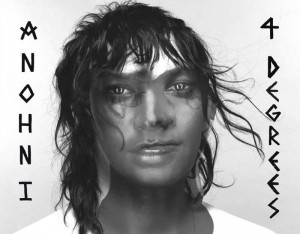 Hopelessness
Hopelessness
by Anohni
Secretly Canadian Records

In addition to the name- and gender-change, Anohni has radically altered her musical style on her solo album Hopelessness. Goodbye gloomy chamber rock, hello electronica. The new album contains eleven songs on nakedly political topics. It opens with “Drone Bomb Me,” sung from the perspective of a Middle Eastern child who perversely sees American bombs as manna from heaven. Other track titles include “Obama” (she’s not a fan), “Execution” (she’s definitely not a fan), and “Violent Men” (ditto). In her indictment of capital punishment, she sings: “Execution, it’s an American Dream. … If Europe takes it away, inject me with something else.” But she doesn’t stop there. Two songs, “Why Did You Separate Me from the Earth?” and “4 Degrees” (the caps add a special urgency) take an ecological turn. They extend the focus of Anohni’s “Manta Ray,” which she co-wrote for the environmentalist documentary Racing Extinction and for which she received an Oscar nomination in 2016 for best original song. In an eloquent open letter, Anohni explained her reason for not attending the awards ceremony as due to the Academy’s flashy commercialism, greed, and what she suspected was its resistance to putting its first transgender nominee front-and-center on Hollywood’s biggest stage.







